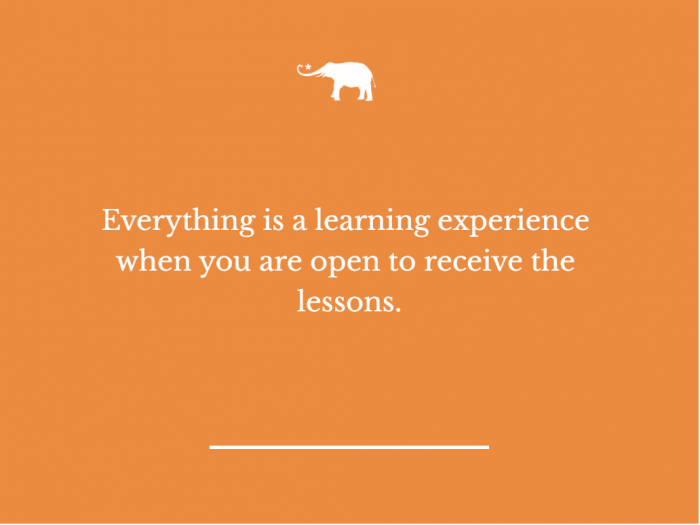I have grieved many times.
When I was younger, I wasn’t even aware of it, which put me in a position where my grief would come out through toxic patterns.
Only as I got older and went to therapy did I learn about grief and the stages of it. And how important it is to be aware of them as they happen, not only after someone passes but also when you end cycles in your life. You can grieve relationships, places, anything and anyone you loved and had to say goodbye to forever.
Why is it important to know what these stages are?
As you grieve, you may feel like it’s taking too long to return to a meaningful life and get impatient with yourself. If you understand what you are going through, then you know it’s temporary. Knowing that it will pass can be comforting. In my experience, though, you forget that a lot. Still, it gave me the chance to understand what was happening and choose to be compassionate and patient with myself.
They are called stages of grief, but it’s also known that they are not linear; they bleed into one another. I would call them layers, and as you make your way through them, they expand and contract, and you may experience more than one at once.
The layers of grief go like this:
Shock and denial are first. Your reality has changed, and you have not yet processed it. Saying, “I can’t believe it,” is common here.
Anger comes next. “What happened is unfair.” It makes you cross. You look for culprits.
Bargaining follows when you wonder if you could have done something to avoid the loss. You ask yourself endless, “What ifs?”
Depression comes next. At this point, you believe it, and you realize that there is nothing you can do about it. That imbues your every cell with sadness.
Acceptance finally makes its way into your heart, as the feelings of depression pass. You can enjoy life again.
Having gone through this multiple times, and having seen and supported friends through it, I have learnt that:
There is still pain after grief—only different.
It took me about a year and a half to go through all of the layers after my mother passed. From denial to anger, to depression, and, finally, to acceptance. It’s been almost three years now. There are still sore spots, and there are still days I miss her and cry my heart out. I’ve gone through all those phases, but that doesn’t mean I’ve stopped missing her, or I don’t feel any kind of pain when I think of her loss. Only that now, it’s different. It’s a resigned kind of pain.
I’m not bargaining anymore. I’m not angry. I’m just sad that she isn’t here, that I can’t call and tell her how my day was. I will never hear her voice again and that hurts. It doesn’t hurt every time I think about her now—only sometimes. I embrace it. I light a candle and talk to her for a bit, and that is soothing.
Pain is inevitable, but suffering is optional.
This is something I’d read about but didn’t really understand until I went through the layers of grief with awareness.
I learned that events occur beyond my control and I can choose how to respond to them. This doesn’t just apply to unexpected loss. You never know what may happen—in the external world, and internally when you are triggered and reminded of the trauma. You can’t really know where and when the pain will hit you. Nonetheless, you can choose what to do with it—ruminate over it and let it take you over, spiral further and further down, or acknowledge it, honor it, and let it pass through you.
Repressing emotional pain only intensifies it and can lead to other nasty things. Paradoxically, to avoid suffering, you need to let yourself feel the pain.
It helps to compartmentalize.
Compartmentalization means keeping things separate—putting one aside so you can focus on another. Normally, one can’t dedicate all their time to processing the loss. There are still things to do outside of that. After I left a long-term relationship, feelings would come up sporadically and interfere with stuff that I had to do. I would walk down the street and feel an overpowering need to cry. I would quickly find a place to hide and let it all out. When I couldn’t focus at work, I took bathroom breaks just to cry.
Slowly, I got into the practice of allocating time in my day to process my feelings. I gave myself 30 minutes to one hour daily to process my big emotions. Giving myself this space separated the grief from the rest of my life. I was able to focus more and get stuff done, while not repressing my emotional side. Spontaneous crying slowly faded as I committed to the practice and grief didn’t bleed into every area of my life.
Positivity can be toxic.
We don’t always know what to do or how to react when people we love go through challenging times. We wish we could just take their pain away because it hurts us to see them suffer. Most people are not comfortable seeing big emotions in others and we might say things like, “please don’t cry,” or, “don’t be sad, look at the bright side.” While these phrases come with the best of intentions, they actually point to the fact that we are not collectively open to witnessing big emotions.
When someone is grieving, their whole reality is shifting, and they need space to process that. Even they don’t know how to manage it, and they need to figure it out. The best thing that you can do for someone is to be present. If you don’t know what to say, it’s better not to say anything. Don’t force it. Just let them know that you are there. When you’re the one who’s grieving, understand that people mean no harm and they are doing the best they know to support you. They may be clumsy at it, but they come from a good place.
God loves me and takes care of me through my friends.
My friends are my chosen family and although I’ve “collected” each one from different places and ages, they always come together not only to celebrate my wins but to support me when I need them. When I couldn’t deal with the loneliness after my breakup, I spent countless nights on my friend’s couch just so I wouldn’t need to stay at home alone. Another friend spent New Year’s with me after my mother died because I didn’t feel like partying. Others came to me with food or just did a daily call to check in on me and let me know they were there.
If there is a silver lining to grief, for me, it was learning that I am loved and supported—even when I am at my lowest.
People know me as happy-go-lucky and cheerful, so letting myself be seen in a state opposite to that was difficult. In my worst moments, I felt most loved, because I understood it wasn’t just my charming personality—they love all of me. And I love them in their human entirety too.
There’s power in vulnerability.
Even when we’re in pain or going through a rough patch, the social norm is to say we’re fine when asked how we are doing. We like to show up in the world as if we had everything together, even when we are falling apart. This is mostly because of what I said before—most people are not comfortable with uncomfortable emotions (in themselves or others). We don’t want our feelings to be a bother to anyone.
Or, we may think that people only love and appreciate us when we are happy. In the fear of losing that, we fake that we’re fine. However, when we decide to show up with vulnerability, openness, and honesty, the same is automatically activated in others. Experience has taught me that when I share something deep and vulnerable about myself, people around me feel safe to open up as well. Talking about my feelings to people has opened channels of meaningful connection, and that is utterly powerful.
Patience. Everything is temporary.
When you are in the abyss of despair, it feels like you’ll never come out. Grief can feel like that, a lot. Regardless of the layer you’re in, it feels like a never-ending story as you live it.
“Will I ever be happy again?” If you lost someone to death, the thought of being happy without them in your life can make you feel guilty. They will never experience earthly happiness, so how can you?
“Will I ever love again?” You’ll ask yourself after a breakup. And you might feel like answering “no,” because the prospect of feeling this pain again is unbearable.
But grief, like everything else, comes and also goes. When you’re in it, it feels like a dead end. Then, with each passing day, you start to see small cracks in the wall and get a glimpse of the light on the other side.
Eventually, you find the exit—forever changed but able to experience meaning again.
 Share on bsky
Share on bsky




Read 0 comments and reply